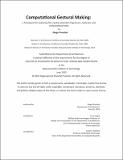| dc.contributor.advisor | Knight, Terry | |
| dc.contributor.author | Pinochet, Diego | |
| dc.date.accessioned | 2023-07-31T19:41:48Z | |
| dc.date.available | 2023-07-31T19:41:48Z | |
| dc.date.issued | 2023-06 | |
| dc.date.submitted | 2023-07-13T21:32:58.357Z | |
| dc.identifier.uri | https://hdl.handle.net/1721.1/151465 | |
| dc.description.abstract | The emergence of digital computation in design reinforced the traditional view that ‘to design’ is ‘to think,’ ‘to represent’ is ‘to plan,’ and ‘to make’ is ‘to fabricate.’ Under this computational design trichotomy, the uniqueness of the gesturing hand to sense, communicate, grasp, shape, and interface in the world has been traditionally overlooked, relegating making as a peripherical stage of the creative process where no intellectual development -apparently- occurs. I argue that hand gestures have the power of blurring the limits imposed by the computational trichotomy reframing design as an integrated process in which representing, thinking, and making are intertwined and inseparable. In this dissertation, I start from the assumption that ‘to make’ equals ‘to design,’ and propose a ‘computational gestural making’ framework to capture the potential of the interaction between human gestures, intelligent machine behavior, and material context. I explore the creative power of the thinking hand through the development of fabrication tools embedded with machine learning algorithms focusing on the interactive, material, and performative aspects of the making process. The scope of this doctoral research centers on establishing a Computational Gestural Making framework that (1) establishes a model for Human, Machine, and Material interaction (2) outlines the development and assessment of a gesture-based framework for interactive design and fabrication as a method for computational gestural making. (3) applies the proposed framework in case studies to assess the means and the effectiveness by which computational gestural making emerges as an alternative way of designing, embracing the uniqueness of the thinking hand as an agent for creating original and authored work. | |
| dc.publisher | Massachusetts Institute of Technology | |
| dc.rights | In Copyright - Educational Use Permitted | |
| dc.rights | Copyright retained by author(s) | |
| dc.rights.uri | https://rightsstatements.org/page/InC-EDU/1.0/ | |
| dc.title | Computational Gestural Making: A framework for exploring the creative potential of gestures, materials, and computational tools | |
| dc.type | Thesis | |
| dc.description.degree | Ph.D. | |
| dc.contributor.department | Massachusetts Institute of Technology. Department of Architecture | |
| dc.identifier.orcid | https://orcid.org/0000-0002-1656-3858 | |
| mit.thesis.degree | Doctoral | |
| thesis.degree.name | Doctor of Philosophy | |
